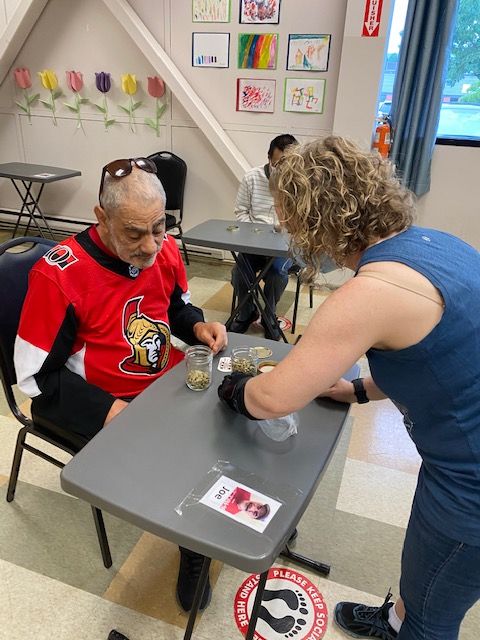Table of Contents
Reports show that as many as 1 in 3 people who have been diagnosed with autism cannot talk. These men and women have a lot to say, and they often want to do regular things with their families and friends. Your loved one with autism who doesn’t talk can still enjoy the following safe, helpful, and fun activities.
Activities for Nonverbal Autistic Adults
Educational Activities
Adults with autism who don’t talk can learn and have fun through various types of educational activities. In addition to exposing your loved one to new ideas, these activities give adults the chance to learn more about things that interest them.
Reading Together
Even if the person you care about can’t read aloud, they can still look through books and magazines. Give them a choice of colourful magazines, field guides, encyclopedias, coffee table books and graphic novels. As you read the articles and they look at the pictures, you can learn about different cultures, people, and animals from all over the world.
Writing, Illustrating and Publishing a Book
Adults with autism tend to be very interested in one specific thing like cars, computers or numbers. Help and encourage the person you care about to write a book or make a video about what they love.
Let them choose the topic and type the script if they can. Then, they can draw the pictures, use a computer program, or use figures and blocks to take pictures. Put the book online or make copies so your loved ones can see what they’ve made.
Building With Blocks
Two adults can work together to make a design out of blocks and a template. This activity takes advantage of your loved one’s strengths in seeing and touching, so they can communicate with their faces and hands.
Social Activities
Adults with autism who don’t talk can improve their social skills and interact with more people through several fun activities. You can encourage someone you care about to do things with other people either one-on-one or in small groups.
Playing Noncompetitive Games and Sports
Swimming, biking and dancing are all fun things that don’t involve competition. You can also change the rules of competitive games and sports to build friendships and show your loved one a wide range of fun things to do with other people.
For example, kick a soccer ball back and forth, reduce the rules of board games, and stack Jenga blocks together instead of pulling them out first.
Making Music
People of all ages, abilities, and interests can enjoy music together. Your loved one can play a favourite song to the beat of rhythm instruments, drumsticks, pots, pans, and spatulas with friends or family. You can also dance to music, hum songs, or make music with water in glasses of different sizes.
Communication Activities
Many adults who can’t talk can still communicate by writing, typing, sign language, picture cards or digital devices. Introduce your loved ones to activities that will help them improve their ability to communicate and interact with the world.
Learn Sign Language
Adults can talk about their feelings, thoughts, and ideas by using sign language, which is a portable way to communicate based on visuals. Sign language can help people feel more confident and independent.
Find a class on sign language online, in a library or somewhere else, and watch it with your partner. Use the signs you learn to talk and interact with other people all day.
Creating Art
Art can be a way for someone you care about to express their thoughts, feelings, emotions and points of view. Give adults the tools they need and encourage them to draw, shape clay, or knit as a way to get creative.
Recreational Activities
Fun activities give adults a way to use up some of their energy. Recreation also helps people build relationships, improve their communication skills and learn new things.
Take a look at this list of fun and interesting activities for adults with autism who don’t talk:
- Cooking
- Walking
- Movies
- Gardening
- Brain Teaser Puzzles
- Hiking
- Sand Play
- Camping
Tips for Choosing Activities for Autistic Non-Verbal Adults
Besides the ones listed above, you may have other ideas for things to do with your loved one.
First, think about how you will choose safe, helpful, and interesting activities for adults with autism who don’t talk.
Utilize Interests
Choose activities based on the person’s interests to get them more involved. If the activity is about something your loved one is interested in, they are more likely to participate and get the most out of it.
Match Abilities
When you choose activities that match the skills of someone you care about, you set them up for success. When matching adults with their abilities, you should think about their motor skills, independence and other relevant factors.
Support Autonomy
Your loved one probably has ideas about the things they like to do (or would like to do). Take the time to listen, and you’ll show respect while bringing up good ideas.
Provide Necessary Support
Sometimes, help can make it easier for your loved one to take part in and enjoy activities. As you help your loved ones, give them tools to help them move around, finding ways to talk to you.
Relieve Pressure
Don’t force your loved ones to play a certain way or join in if they don’t want to. Activities should be fun, easy and enjoyable.
Choose OCL’s Activities for Nonverbal Autistic Adults
Adults with autism who don’t speak can do many things. You can help your loved one by doing one of the safe, helpful, and interesting things on this list, or you can do something else that your loved one will enjoy and value.
For more information about how we help adults with autism who don’t talk, please call us in Ottawa at (613) 254-9400 or visit ocl.ca online.



